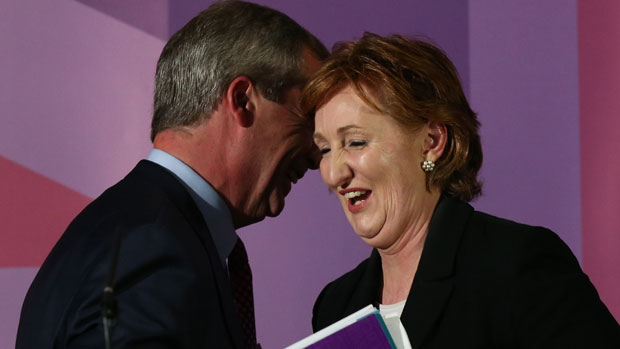Ukip's Suzanne Evans fails to get suspension overturned
Former deputy chairwoman given six-month ban after criticising fellow party member

A free daily email with the biggest news stories of the day – and the best features from TheWeek.com
You are now subscribed
Your newsletter sign-up was successful
Former Ukip deputy chairwoman Suzanne Evans has failed to get the High Court to overturn her six-month suspension from the party.
The ban, given for an alleged "number of specific complaints", says The Guardian, will stop her running as a candidate in May's London Assembly elections.
She had been seeking an injunction preventing the suspension from taking effect until after nominations closed at the end of March.
The Week
Escape your echo chamber. Get the facts behind the news, plus analysis from multiple perspectives.

Sign up for The Week's Free Newsletters
From our morning news briefing to a weekly Good News Newsletter, get the best of The Week delivered directly to your inbox.
From our morning news briefing to a weekly Good News Newsletter, get the best of The Week delivered directly to your inbox.
On Wednesday, Ukip confirmed that a disciplinary meeting had found Evans had publicly criticised a fellow candidate and presented herself as a party spokesman without authority.
She signed a petition last month calling on the party to deselect London Assembly candidate Alan Craig for making anti-gay remarks.
Once tipped to be next Ukip leader, Evans said she was "stunned and distressed" by the decision, which casts a spotlight on the divisions within the anti-EU party.
In her court filing, she accused Ukip leader Nigel Farage of a "vendetta".
A free daily email with the biggest news stories of the day – and the best features from TheWeek.com
Evans was "dumped yesterday in the latest twist to a vicious civil war blazing in the right-wing group", reports The Sun. "Insiders said it appeared she was paying the price for daring to challenge Ukip chief Nigel Farage."
She supports the Vote Leave group in the EU referendum campaign, while he is behind rival Brexit group Grassroots Out.
As well as Evans, Farage and his allies are suspicious of Douglas Carswell, the party's only MP, says The Guardian.
However, former communications chief Patrick O'Flynn, a Ukip MEP, has led the efforts to get Evans reinstated.
Responding to the suspension, Farage told Sky News his colleague had gone "from being a popular figure in Ukip to become a very unpopular figure by constantly criticising, not just the leader, but the party [and] its direction".
He added: "Sometimes [people] say and do things that perhaps they shouldn't."
-
 6 of the world’s most accessible destinations
6 of the world’s most accessible destinationsThe Week Recommends Experience all of Berlin, Singapore and Sydney
-
 How the FCC’s ‘equal time’ rule works
How the FCC’s ‘equal time’ rule worksIn the Spotlight The law is at the heart of the Colbert-CBS conflict
-
 What is the endgame in the DHS shutdown?
What is the endgame in the DHS shutdown?Today’s Big Question Democrats want to rein in ICE’s immigration crackdown
-
 How corrupt is the UK?
How corrupt is the UK?The Explainer Decline in standards ‘risks becoming a defining feature of our political culture’ as Britain falls to lowest ever score on global index
-
 Three consequences from the Jenrick defection
Three consequences from the Jenrick defectionThe Explainer Both Kemi Badenoch and Nigel Farage may claim victory, but Jenrick’s move has ‘all-but ended the chances of any deal to unite the British right’
-
 The high street: Britain’s next political battleground?
The high street: Britain’s next political battleground?In the Spotlight Mass closure of shops and influx of organised crime are fuelling voter anger, and offer an opening for Reform UK
-
 Nigel Farage’s £9mn windfall: will it smooth his path to power?
Nigel Farage’s £9mn windfall: will it smooth his path to power?In Depth The record donation has come amidst rumours of collaboration with the Conservatives and allegations of racism in Farage's school days
-
 Is a Reform-Tory pact becoming more likely?
Is a Reform-Tory pact becoming more likely?Today’s Big Question Nigel Farage’s party is ahead in the polls but still falls well short of a Commons majority, while Conservatives are still losing MPs to Reform
-
 Nigel Farage: was he a teenage racist?
Nigel Farage: was he a teenage racist?Talking Point Farage’s denials have been ‘slippery’, but should claims from Reform leader’s schooldays be on the news agenda?
-
 Five takeaways from Plaid Cymru’s historic Caerphilly by-election win
Five takeaways from Plaid Cymru’s historic Caerphilly by-election winThe Explainer The ‘big beasts’ were ‘humbled’ but there was disappointment for second-placed Reform too
-
 Taking the low road: why the SNP is still standing strong
Taking the low road: why the SNP is still standing strongTalking Point Party is on track for a fifth consecutive victory in May’s Holyrood election, despite controversies and plummeting support